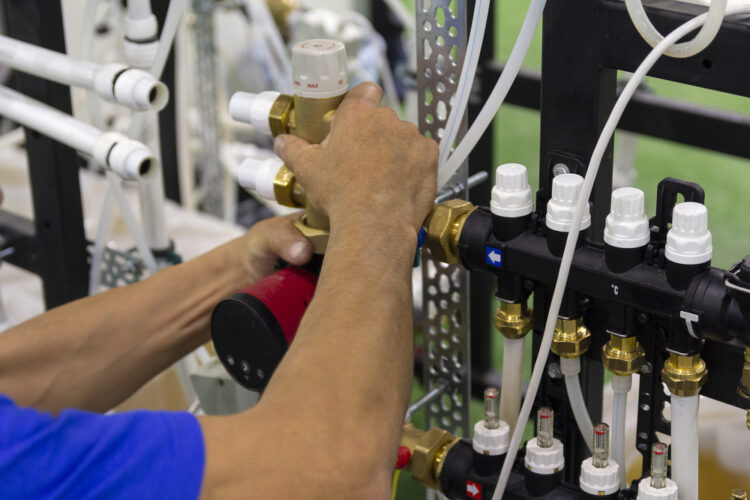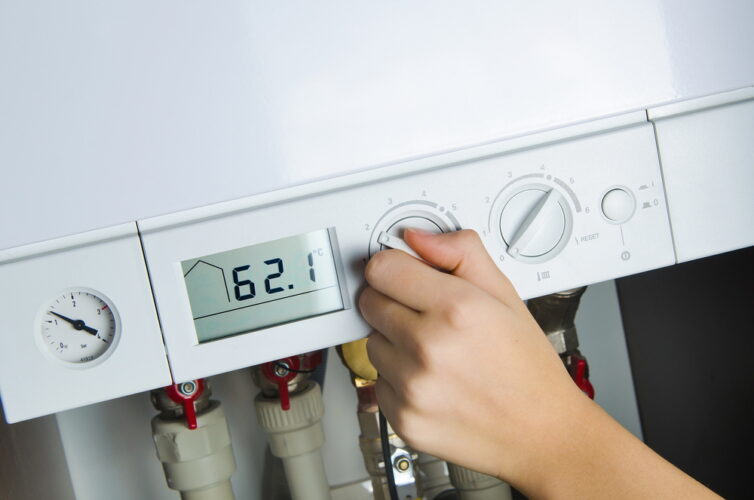Central heating pumps are a classic heating system in most houses.
Unfortunately, they can be frustrating when they break down.
Sometimes the issue is not significant.
A simple issue as an off-sound can be irritating, especially in a cozy warm winter.
It is best to fix these sounds as fast as possible.

An airlock causes noise in the central heating pump. It can also result from heat pump overrun.
However, note that noisy pipes are familiar and pretty standard. Never panic if the noise gets to you. No need to call a plumber or engineer when you can fix it in a few simple and practical steps.
Understanding the Noises
I have learned over time that central heating pump noises are nothing to worry about. The cause behind these noises is simple to figure out and fix. Understand some of the common reasons for easy troubleshooting and diagnosis.
An Airlock Issue

This problem results in knocking and banging sounds. These are the most common sounds and noises from central heating pumps. The noises come up when air enters the unit and fails to travel as it should.
Consequently, there is an air-trapping situation in various places of the unit. The result is noisy radiators, heating pipes, radiators, and the boiler pump.
Fix this by bleeding the central heating pumping to eliminate the airlocks. The noise will also go away after this. You need a bleed screw for the central heating unit to materialize. Fortunately, most modern heating pumps come with a screw.
First, unscrew the unit until you get a hissing sound. Let it stay this way until the hissing sound ends. A dribble of water indicates that the pump has completed the air bleeding process. At this point, closing the screw is the best option.
Incorrect Pump Installation (the pump shaft is not horizontally placed)
This problem comes with whining, knocking, and banging sounds. Check for installation mishaps if such sounds persist even after bleeding the air. Note that this is often the next common issue.
Improper pump installation leads to continued airlocks regardless of the prior bleeding. Chances are that the pump will be noisy even with the airlock removal. Besides that, incorrect pump installation results in excessive shaft bearing wear. This is what causes the whining noise from the heating pump.
The good news is that it is a fixable problem. Make sure the pump is in a horizontal position. This means that the screw that bleeds airlocks is at the side. If the positions are not in this sequence, adjust to avoid the screw coming on top.
Note that any position change can affect the pump’s ability to circulate water properly. Additionally, it leads to premature wear and tears.
Seizure of Internal Components

This problem causes a vibrating or/and humming noise/ sound. Chances are that there is a seizure in your pump’s shaft. Confirm this if you keep hearing humming sounds with increased vibrations.
Usually, the pump releases excess energy from its shaft. This energy converts into noises and also causes the pump to overheat.
Fix this by tapping on the pump’s side. A slight tap frees the seized internal parts. Unfortunately, this is but a temporary fix. It is necessary to open up the pump and have it cleaned.
Once you open up the pump, examine the shaft’s bearing. Make sure it sits horizontally. In case the bearing wears out, the pump will keep seizing.
Dirt Blocking the Pump
If some dirt is blocking the pump, you will hear humming and vibrating sounds coming from it. If all the other remedies fail to work, consider dirt blockage. This may be the reason behind the pump’s continued humming and vibrations.
This happens mostly in cases where the heater has no boiler filter. It can also occur in the wrong filter installation. It happens more with older central heating units. This is because of the years of accumulating dirt and debris.
This is fixable by taking the pump apart first. This allows you to access the pump’s internals and clean it thoroughly. While at it, inspect it for wear and tear. If everything is in great shape and working condition, fit in a boiler filter to catch any future debris. This ensures that no residue goes unnoticed in the future.
Wrong Speed Settings

You may hear loud humming if the pump has the wrong speed setting. This is different from humming sounds from the other issues.
Note that the improper speed setting affects the heating unit. There will be lots of energy wastage since the unit generates higher flow rates than the pump needs. This means that the pump does not function efficiently.
Fix this by finding the pump’s flow rate setting switch. Turn the switch down if it is on the highest setting. Confirm if the towel rails and radiators are still getting to the right temperatures. If they do, then the setting is appropriate.
Note that the above problems and associated sounds can persist despite troubleshooting efforts. If they continue without ceasing, proceed to hire a professional to help diagnose and fix it.
The solutions you try may not work in the long term. In such instances, the input of a professional is much more critical. However, before spending money on professionals, try all possible fixes.
FAQs
How do you fix a noisy circulator pump?
Check for the size of the pump. Oversized pumps are problematic and noisy. Throttle the pressure-sized valves to eliminate the noises. If the noise comes from undersized pumps, consider installing a larger one.
Why is my circulating pump making noise?
Most recirculating pumps are noisy when there is clogging somewhere. Clean this unit with water to prevent the sediments from wearing the pump or clogging the impeller. These two scenarios are responsible for the noises.
Can you make a heat pump quieter?
Consider installing a compressor blanket wrap. Have a professional plumber help with this. The wraps have noise-reducing capacities, thanks to the material. The pump will thus emit less noise.